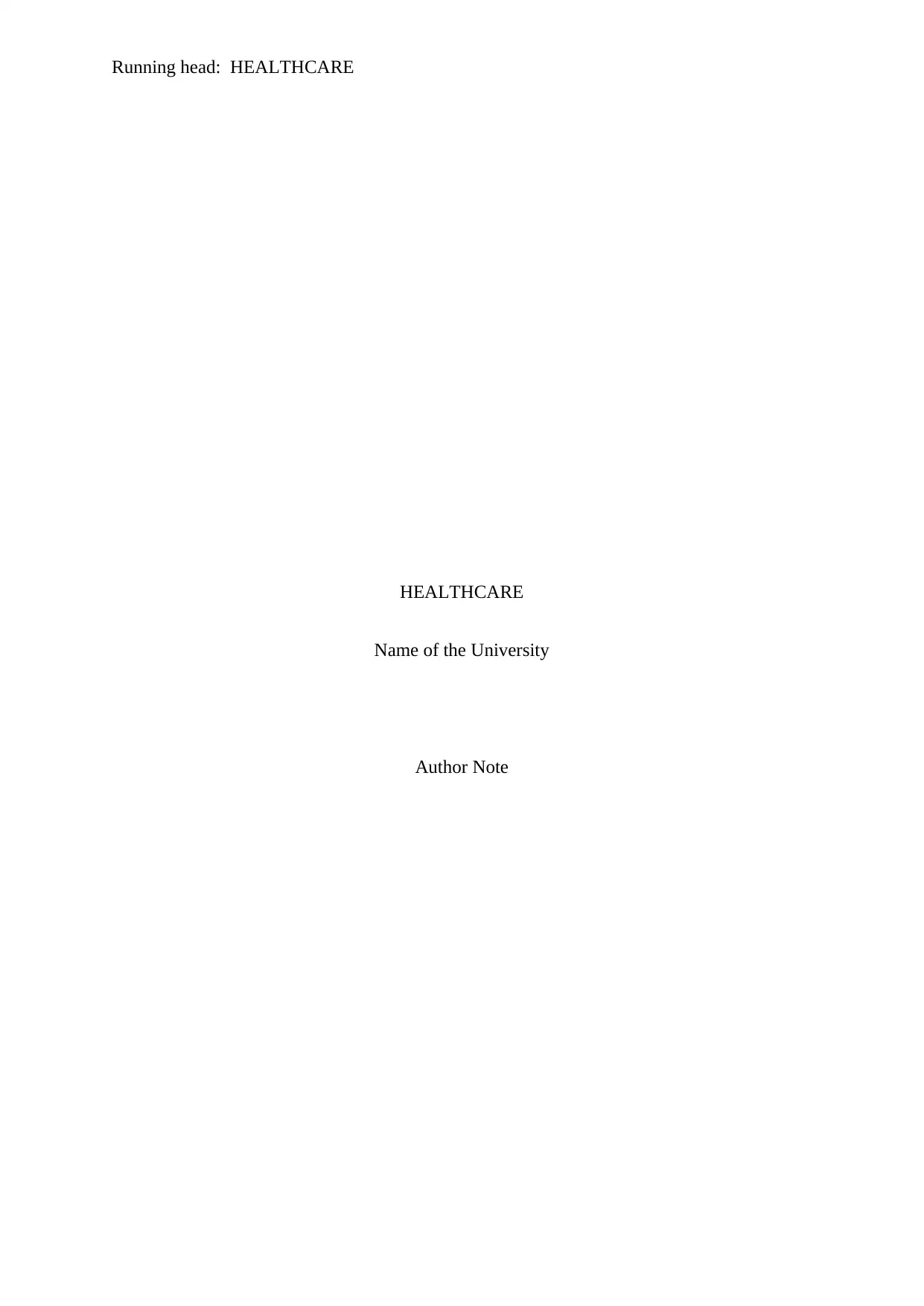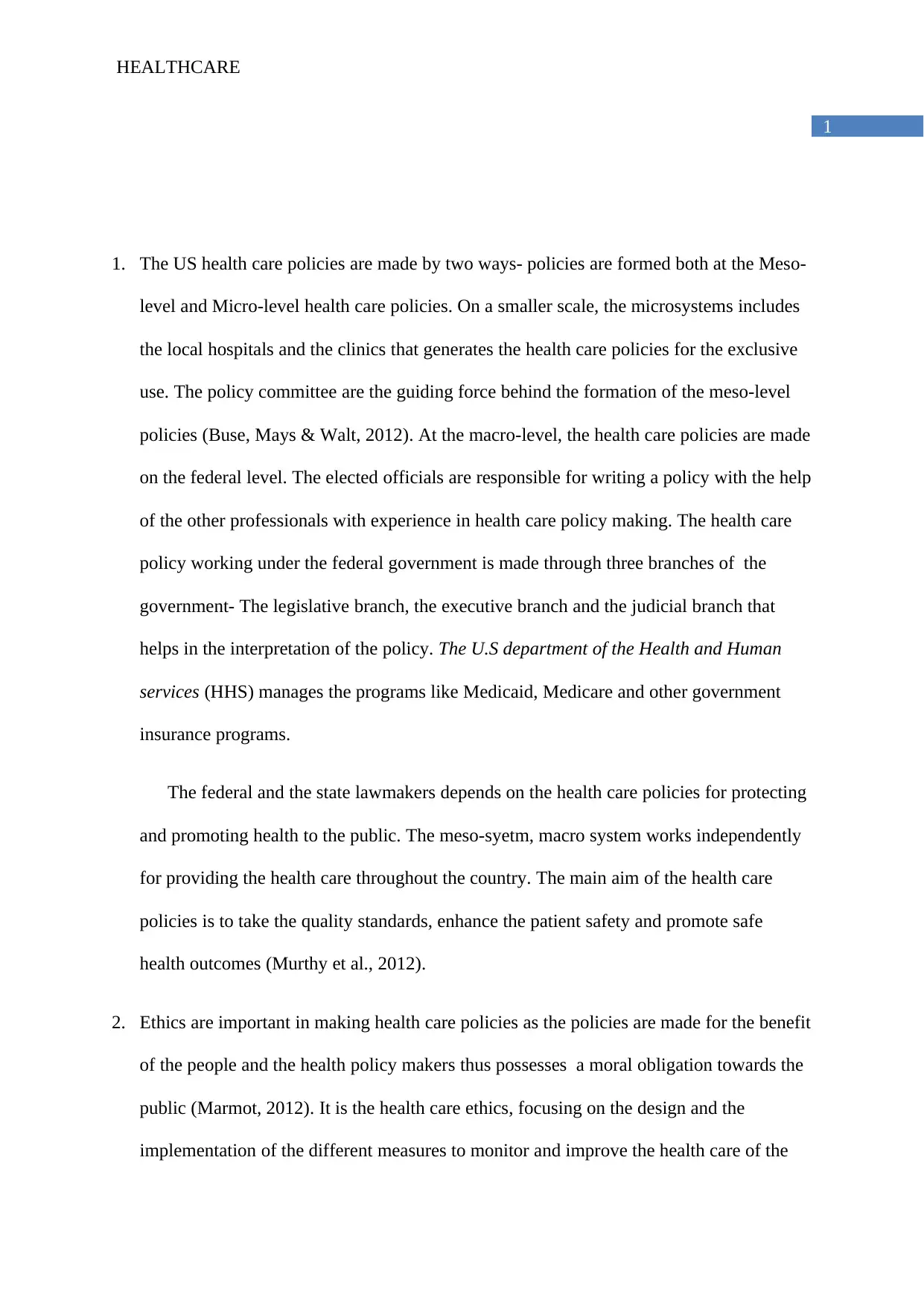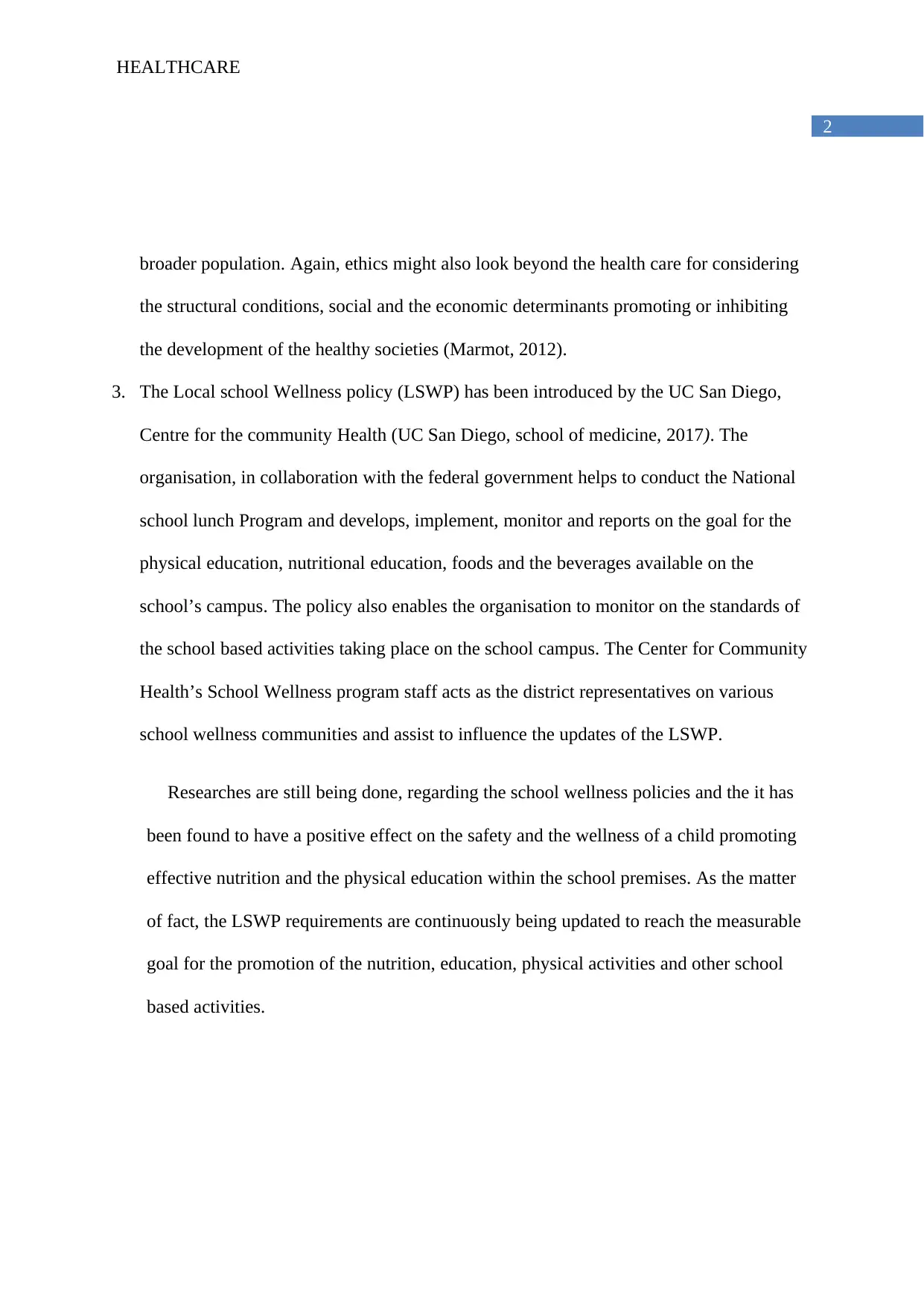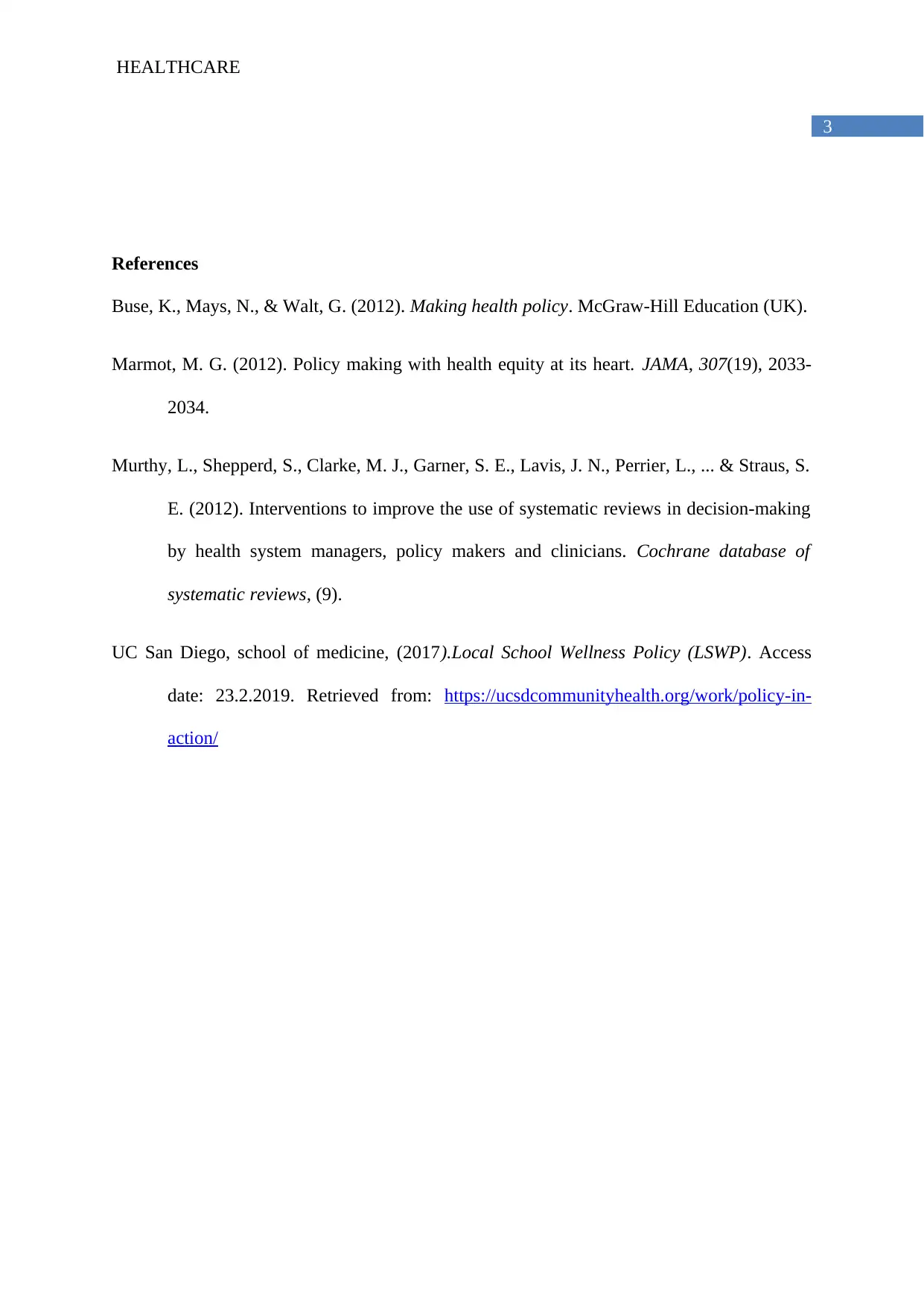Analyzing Health Policy's Impact on Population Health Outcomes
VerifiedAdded on 2023/04/22
|4
|733
|438
Essay
AI Summary
This essay discusses the creation of health policies at different levels (micro, meso, and macro) and their purpose in improving population health in the U.S. It emphasizes the importance of ethical decision-making in policy development, highlighting the moral obligation of policymakers to the public. The essay provides an example of a local health policy, the Local School Wellness Policy (LSWP) by UC San Diego, and its positive effects on child nutrition and physical education. The essay concludes that health policies aim to enhance patient safety, promote safe health outcomes, and continuously update requirements to promote nutrition, education, and physical activities.

Running head: HEALTHCARE
HEALTHCARE
Name of the University
Author Note
HEALTHCARE
Name of the University
Author Note
Paraphrase This Document
Need a fresh take? Get an instant paraphrase of this document with our AI Paraphraser

1
HEALTHCARE
1. The US health care policies are made by two ways- policies are formed both at the Meso-
level and Micro-level health care policies. On a smaller scale, the microsystems includes
the local hospitals and the clinics that generates the health care policies for the exclusive
use. The policy committee are the guiding force behind the formation of the meso-level
policies (Buse, Mays & Walt, 2012). At the macro-level, the health care policies are made
on the federal level. The elected officials are responsible for writing a policy with the help
of the other professionals with experience in health care policy making. The health care
policy working under the federal government is made through three branches of the
government- The legislative branch, the executive branch and the judicial branch that
helps in the interpretation of the policy. The U.S department of the Health and Human
services (HHS) manages the programs like Medicaid, Medicare and other government
insurance programs.
The federal and the state lawmakers depends on the health care policies for protecting
and promoting health to the public. The meso-syetm, macro system works independently
for providing the health care throughout the country. The main aim of the health care
policies is to take the quality standards, enhance the patient safety and promote safe
health outcomes (Murthy et al., 2012).
2. Ethics are important in making health care policies as the policies are made for the benefit
of the people and the health policy makers thus possesses a moral obligation towards the
public (Marmot, 2012). It is the health care ethics, focusing on the design and the
implementation of the different measures to monitor and improve the health care of the
HEALTHCARE
1. The US health care policies are made by two ways- policies are formed both at the Meso-
level and Micro-level health care policies. On a smaller scale, the microsystems includes
the local hospitals and the clinics that generates the health care policies for the exclusive
use. The policy committee are the guiding force behind the formation of the meso-level
policies (Buse, Mays & Walt, 2012). At the macro-level, the health care policies are made
on the federal level. The elected officials are responsible for writing a policy with the help
of the other professionals with experience in health care policy making. The health care
policy working under the federal government is made through three branches of the
government- The legislative branch, the executive branch and the judicial branch that
helps in the interpretation of the policy. The U.S department of the Health and Human
services (HHS) manages the programs like Medicaid, Medicare and other government
insurance programs.
The federal and the state lawmakers depends on the health care policies for protecting
and promoting health to the public. The meso-syetm, macro system works independently
for providing the health care throughout the country. The main aim of the health care
policies is to take the quality standards, enhance the patient safety and promote safe
health outcomes (Murthy et al., 2012).
2. Ethics are important in making health care policies as the policies are made for the benefit
of the people and the health policy makers thus possesses a moral obligation towards the
public (Marmot, 2012). It is the health care ethics, focusing on the design and the
implementation of the different measures to monitor and improve the health care of the

2
HEALTHCARE
broader population. Again, ethics might also look beyond the health care for considering
the structural conditions, social and the economic determinants promoting or inhibiting
the development of the healthy societies (Marmot, 2012).
3. The Local school Wellness policy (LSWP) has been introduced by the UC San Diego,
Centre for the community Health (UC San Diego, school of medicine, 2017). The
organisation, in collaboration with the federal government helps to conduct the National
school lunch Program and develops, implement, monitor and reports on the goal for the
physical education, nutritional education, foods and the beverages available on the
school’s campus. The policy also enables the organisation to monitor on the standards of
the school based activities taking place on the school campus. The Center for Community
Health’s School Wellness program staff acts as the district representatives on various
school wellness communities and assist to influence the updates of the LSWP.
Researches are still being done, regarding the school wellness policies and the it has
been found to have a positive effect on the safety and the wellness of a child promoting
effective nutrition and the physical education within the school premises. As the matter
of fact, the LSWP requirements are continuously being updated to reach the measurable
goal for the promotion of the nutrition, education, physical activities and other school
based activities.
HEALTHCARE
broader population. Again, ethics might also look beyond the health care for considering
the structural conditions, social and the economic determinants promoting or inhibiting
the development of the healthy societies (Marmot, 2012).
3. The Local school Wellness policy (LSWP) has been introduced by the UC San Diego,
Centre for the community Health (UC San Diego, school of medicine, 2017). The
organisation, in collaboration with the federal government helps to conduct the National
school lunch Program and develops, implement, monitor and reports on the goal for the
physical education, nutritional education, foods and the beverages available on the
school’s campus. The policy also enables the organisation to monitor on the standards of
the school based activities taking place on the school campus. The Center for Community
Health’s School Wellness program staff acts as the district representatives on various
school wellness communities and assist to influence the updates of the LSWP.
Researches are still being done, regarding the school wellness policies and the it has
been found to have a positive effect on the safety and the wellness of a child promoting
effective nutrition and the physical education within the school premises. As the matter
of fact, the LSWP requirements are continuously being updated to reach the measurable
goal for the promotion of the nutrition, education, physical activities and other school
based activities.
⊘ This is a preview!⊘
Do you want full access?
Subscribe today to unlock all pages.

Trusted by 1+ million students worldwide

3
HEALTHCARE
References
Buse, K., Mays, N., & Walt, G. (2012). Making health policy. McGraw-Hill Education (UK).
Marmot, M. G. (2012). Policy making with health equity at its heart. JAMA, 307(19), 2033-
2034.
Murthy, L., Shepperd, S., Clarke, M. J., Garner, S. E., Lavis, J. N., Perrier, L., ... & Straus, S.
E. (2012). Interventions to improve the use of systematic reviews in decision‐making
by health system managers, policy makers and clinicians. Cochrane database of
systematic reviews, (9).
UC San Diego, school of medicine, (2017).Local School Wellness Policy (LSWP). Access
date: 23.2.2019. Retrieved from: https://ucsdcommunityhealth.org/work/policy-in-
action/
HEALTHCARE
References
Buse, K., Mays, N., & Walt, G. (2012). Making health policy. McGraw-Hill Education (UK).
Marmot, M. G. (2012). Policy making with health equity at its heart. JAMA, 307(19), 2033-
2034.
Murthy, L., Shepperd, S., Clarke, M. J., Garner, S. E., Lavis, J. N., Perrier, L., ... & Straus, S.
E. (2012). Interventions to improve the use of systematic reviews in decision‐making
by health system managers, policy makers and clinicians. Cochrane database of
systematic reviews, (9).
UC San Diego, school of medicine, (2017).Local School Wellness Policy (LSWP). Access
date: 23.2.2019. Retrieved from: https://ucsdcommunityhealth.org/work/policy-in-
action/
1 out of 4
Related Documents
Your All-in-One AI-Powered Toolkit for Academic Success.
+13062052269
info@desklib.com
Available 24*7 on WhatsApp / Email
![[object Object]](/_next/static/media/star-bottom.7253800d.svg)
Unlock your academic potential
Copyright © 2020–2025 A2Z Services. All Rights Reserved. Developed and managed by ZUCOL.





